|
|
|
Sort Order |
|
|
|
Items / Page
|
|
|
|
|
|
|
| Srl | Item |
| 1 |
ID:
118472
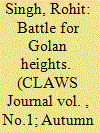

|
|
|
| 2 |
ID:
133528
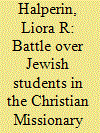

|
|
|
|
|
| Publication |
2014.
|
| Summary/Abstract |
Studies of Jewish students in Palestine's Christian missionary schools largely end at the close of the Ottoman period. But although a tiny and diminishing fraction of Jewish students studied in such schools after the First World War, the mandate period was marked by anxious and often zealous Zionist anti-missionary campaigns. The article considers this space of Jewish-Christian interaction, arguing that even as a Hebrew-dominant society took root, missionary schools provided education in European languages, particularly English, tools that offered advantages to Jewish students with an interest in clerical work or foreign study. The continuing appeal and importance of foreign language skills cast doubt on the Zionist pretence of a self-sufficient Hebrew society.
|
|
|
|
|
|
|
|
|
|
|
|
|
|
|
|
| 3 |
ID:
098060
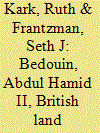

|
|
|
| 4 |
ID:
108814
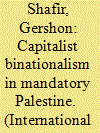

|
|
|
|
|
| Publication |
2011.
|
| Summary/Abstract |
In response to the outbreak of the Arab Revolt of 1936, a coterie of five prominent entrepreneurs and intellectuals in the Mandatory Jewish community formulated a capitalist binationalist resolution of the Israeli-Palestinian conflict. This paper examines the genesis of and debate over the little-known Concord they proposed and compares it with better-known liberal and socialist binationalist plans. "The Five," as they came to be known, were the only binationalists seeking to base political parity on economic integration. The occasion of their blueprint allows further exploration of the preconditions for an effective binationalist program, among them the structure of labor markets, political preferences of minorities and majorities in regard to sovereignty, and levels of mutual trust. Ultimately, binationalist resolutions of the Israeli-Palestinian conflict were precluded by the Labor Settlement Movement's separatist state-building strategy.
|
|
|
|
|
|
|
|
|
|
|
|
|
|
|
|
| 5 |
ID:
127513
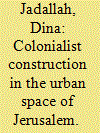

|
|
|
|
|
| Publication |
2014.
|
| Summary/Abstract |
This article examines the matrix of Israel's urban interventions using territorial and demographic engineering to transform Jerusalem into a closer approximation of Zionist ideological conceptualization. It argues that the state deploys archaeological, cultural, sociopolitical, territorial, and urban design instruments to deconstruct or re-narrate the other histories and characteristics of the city in order to preempt alternative sovereignties. The asymmetrical power of the Israeli state is constantly challenged in urban spaces and quotidian practices by Palestinians who hold competing discourses. Palestinians contest Israel's conceptualization through discourses that do not ascribe to the state project, emphasizing that identity is not exclusive to one ethnicity or religion, while working to sustain and strengthen an alternative sovereignty.
|
|
|
|
|
|
|
|
|
|
|
|
|
|
|
|
| 6 |
ID:
130510
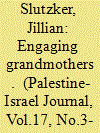

|
|
|
|
|
| Publication |
2011.
|
| Summary/Abstract |
In a small office in the West Bank town of Beit Jallah, just 10 minutes by car from Jerusalem, Tamara Rabinowitz and Siham Abu Awwad sit sipping thick Arabic coffee and finishing each other's sentences. To many in their communities they would seem a very unlikely pair of friends. Tamara, who immigrated to Israel from London in 1960, lost her son Ido in 1987 when he was serving in the Israel Defense Forces in Lebanon. Siham's brother Youssef was shot and killed by an IDF soldier at a checkpoint near their village. Her mother was a Palestinian political activist who served time in Israeli prison, along with three of Siham's brothers.
|
|
|
|
|
|
|
|
|
|
|
|
|
|
|
|
| 7 |
ID:
098968
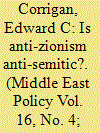

|
|
|
| 8 |
ID:
100751
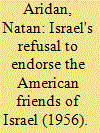

|
|
|
|
|
| Publication |
2010.
|
| Summary/Abstract |
The aim in presenting and analyzing the document below on Israel's refusal to endorse the proposed AFI, the American Friends of Israel, in March 1956, which it considered a threat to existing pro-Israel advocacy activities, is not only a fascinating account of the origins of Israel's ambivalence regarding garnering support for its case on Capitol Hill, but also serves as an interesting parallel to the current controversy relating to Israel's policy toward the recently established radical alternative lobby for Israel, J Street. 2
J Street invited Ambassador Michael Oren to address its first Washington conference; however, after an extended delay Oren declined. 3 The embassy issued a statement saying that it would be "privately communicating its concerns over certain policies of the organization that may impair the interests of Israel". J Street leader Jeremy Ben-Ami did not "understand how it is in the State of Israel's interest to look at J Street as a problem, to write off an organization that represents a large number of American Jews."
It should come as no surprise that Oren balked at attending their recent annual conference. Since its inception, the MFA (Ministry of Foreign Affairs) has refused to endorse pro-Israel organizations it has deemed either ineffective or unwilling to be "instructed" by Israel's diplomatic representatives. Although AIPAC (American Israel Public Affairs Committee) 4 was established and financed by American citizens, by sanctioning AIPAC's monopoly Israel has consistently aimed to diminish the competition, thus ensuring that the source, gathering, and dissemination of information would be controlled by Israel.
Israel's foreign relations have been directed by the MFA and its diplomatic representatives who inevitably supplanted the Zionist organizations that had for more than thirty years regarded themselves as the official
|
|
|
|
|
|
|
|
|
|
|
|
|
|
|
|
| 9 |
ID:
138573
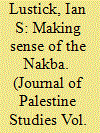

|
|
|
|
|
| Summary/Abstract |
Zionist claims to rightful rule of most or all of Palestine/the Land of Israel ultimately depend on naturalizing those claims into common sense, for Jews, of course, but also for the international community. Following the 1967 war, Israelis in favor of withdrawing from occupied territories have relied on distinguishing between the justice of the 1949 Armistice Lines, and the process that led to the State of Israel within those lines, versus the injustice of the occupation of territories conquered in 1967 and of their settlement and gradual absorption. But as the truth of the expulsions and forced dispossession of Palestinians in 1948 becomes accepted by wider swaths of both Israeli-Jewish and international public opinion, the traditional narrative distinguishing the justice of 1948 and the injustice of 1967 breaks down. Ari Shavit’s book, My Promised Land, can be understood as a response by Israeli two-staters to accusations of hypocrisy by the extreme right.
|
|
|
|
|
|
|
|
|
|
|
|
|
|
|
|
| 10 |
ID:
107018
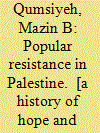

|
|
|
|
|
| Publication |
London, Pluto Press, 2011.
|
| Description |
ix, 290p.
|
| Standard Number |
9780745330693
|
|
|
|
|
|
|
|
|
|
|
|
Copies: C:1/I:0,R:0,Q:0
Circulation
| Accession# | Call# | Current Location | Status | Policy | Location |
| 056169 | 956.94/QUM 056169 | Main | On Shelf | General | |
|
|
|
|
| 11 |
ID:
098057
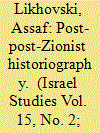

|
|
|
| 12 |
ID:
130512
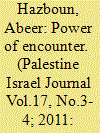

|
|
|
|
|
| Publication |
2011.
|
| Summary/Abstract |
We realized the need for "deeper understanding," allowing students the space and time to talk about culture, identity, their fears and the conflict itself.
How many of us have planned our lives to take a specific direction, only to find ourselves 10 years later in a totally different place? Seven years ago, a friend of mine introduced me to a group of people who were studying abroad and came to Jerusalem wanting to do something about the conflict. One of those people was a student at MIT who had taught computer science in an MIT program in Africa. He thought we might be able to do something similar for Israeli and Palestinian youths. As we all believed in education as a powerful tool to mobilize positive change, during the summer of 2004 we started the Middle East Education for Technology program, or MEET, based in Jerusalem.
|
|
|
|
|
|
|
|
|
|
|
|
|
|
|
|
| 13 |
ID:
122818
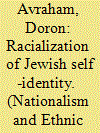

|
|
|
|
|
| Publication |
2013.
|
| Summary/Abstract |
While excluded from society and subjected to discrimination under government measures, German Jews under the Nazi regime during 1933-38 had conducted a public discourse regarding their collective identity. Acknowledging the failure of emancipation, Zionist and Orthodox Jews used racial vocabulary and concepts to produce an independent stance and to define political ends. Such an effort, however, did not begin during the 1930s. It was a reinforcement of racial ideas prevalent among German Jewish scientists since the late 19th century. In the 1930s, though, this "racialization" turned into a popular one, thus forming Jewish public opinion and political aspirations. It functioned as a means to respond to the inferior racial status and exclusion imposed on German Jewry by the Nazis.
|
|
|
|
|
|
|
|
|
|
|
|
|
|
|
|
| 14 |
ID:
120847
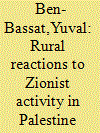

|
|
|
|
|
| Publication |
2013.
|
| Summary/Abstract |
The central Ottoman archives in Istanbul provide a unique bottom-up perspective on the early Zionist-Arab encounters in Palestine at the end of the nineteenth and early twentieth centuries and the interactions between the rural population and the first Zionist colonists. This perspective is somewhat different from the customary outlook in the literature on early Arab reactions to Zionist activity which has primarily focused on the reactions of the educated urban elites in the aftermath of the Young Turk revolution of 1908. This study discusses five petitions sent by the rural population of Palestine, both villagers and Bedouins, against Jewish activity and its impact on them. The petitions by these understudied subaltern groups reveal the complexities of the encounters between the two populations prior to the development of the political struggle in Palestine, and add a new dimension to the more familiar viewpoint provided by Zionist and European sources. This article thus seeks to examine the extent to which the revolution, which is commonly considered a watershed for the start of the Jewish-Arab political struggle, is reflected in these petitions. It also inquires whether there was a change of tone in the petitions following the revolution and, if so, what can be learned from them regarding the nature of Jewish-Arab relationships at the time.
|
|
|
|
|
|
|
|
|
|
|
|
|
|
|
|
| 15 |
ID:
133307
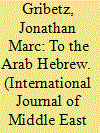

|
|
|
|
|
| Publication |
2014.
|
| Summary/Abstract |
To the Arab Hebrew [la-?ivriyah ha-?arviyah]! If you are a Hebrew, you are not an Arab. If an Arab, not a Hebrew. So, you are neither a Hebrew nor an Arab . . . C.Q.F.D." This paid announcement, published by an anonymous reader of the Jerusalem-based Hebrew newspaper ha-Tsevi on 27 November 1908, reminds us that the idea of an Arab Jew (or, in the parlance of Palestinian Hebrew in the early 20th century, an Arab Hebrew) has been at once present and contested from the early years of Zionist settlement in Palestine. Moreover, the contestation was (as it remains) often more emotional than logical (ce qu'il fallait démontrer notwithstanding). But the category of Arab Hebrew was not constructed simply to be attacked; for some, including another personal advertiser on the very same page of ha-Tsevi, Arab Hebrew was a self-proclaimed identity. "To M. M.," he or she wrote, "I saw you, I knew you, I respected you. I will leave you, I will remember you, and I will not forget you." This mysterious
|
|
|
|
|
|
|
|
|
|
|
|
|
|
|
|
| 16 |
ID:
099355
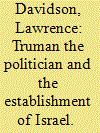

|
|
|
|
|
| Publication |
2010.
|
| Summary/Abstract |
Harry S. Truman was a temperamental and politically ambitious man. Both his sensitivities and ambition influenced his actions during his presidency. This was particularly the case when it came to Palestine because there existed a strong domestic Zionist lobby that played to Truman's wants and needs in order to influence his decision making. This article examines that process of policy formulation and shows how personality played into the president's behavior in ways that allowed the Zionist lobby to accomplish its ends. Though Truman's actions can be seen as a product of his personal sensitivities, his prioritizing of domestic political ambitions with regard to policy on Palestine set a harmful precedent for the future.
|
|
|
|
|
|
|
|
|
|
|
|
|
|
|
|
| 17 |
ID:
106555
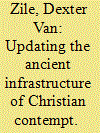

|
|
|
| 18 |
ID:
095622
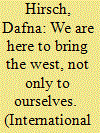

|
|
|
| 19 |
ID:
131869
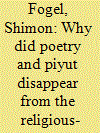

|
|
|
|
|
| Publication |
2014.
|
| Summary/Abstract |
This article reviews the process by which the presence of piyut - liturgical poetry - in (Ashkenazi) Religious-Zionist High Holy Day prayer books was curtailed. Piyut is examined here, in part, as a representative of non-institutionalised prayer reflecting grassroots tradition (and varying ethnic custom) as opposed to the letter of halakhic law. From this perspective, the process of decreasing the use of piyutim will be examined as the result of both the Orthodox movement and modern literary critique of piyut poetics.
|
|
|
|
|
|
|
|
|
|
|
|
|
|
|
|
| 20 |
ID:
130513
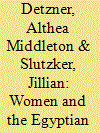

|
|
|
|
|
| Publication |
2011.
|
| Summary/Abstract |
Yet, despite the critical roles played by thousands of women during the revolution, female voices and women 's rights continue to be excluded from the emerging power structures and the national political agenda in silenced in post-Mubarak Egypt. Women, Nonviolent Action and the Cycle of Marginalization Nonviolent action, or civil resistance, is a civilian-based method of waging asymmetric conflict. It has been used in struggles for human rights.
|
|
|
|
|
|
|
|
|
|
|
|
|
|
|
|
|
|
|
|
|